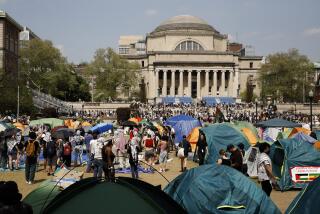It’s Not the ‘60s, but Berkeley’s Anti-War Tradition Lives
- Share via
BERKELEY — At first glance, the scene looks like the Berkeley of 1970. Students barricaded inside the campus ROTC building, chanting, “No war, no way, U.S. out!,” demanding that American soldiers be brought home from a faraway battlefield. It is, however, the Berkeley anti-war movement of 1991, and, although still only a small constituency on campus, this generation of students is making sure not to commit the mistakes of their predecessors.
This past fall, the media--from the New York Times to “Good Morning America”--turned up at UC Berkeley, wondering, only a month into the semester, why students weren’t shutting down the campus, creating the same havoc that their parents raised two decades ago to stop a war. Why students weren’t nurturing a mass student movement to protest the military buildup of U.S. troops in the Persian Gulf. But the reporters were asking the wrong questions and reporting the wrong conclusions.
Reporters turned up at Berkeley prematurely; it takes more than a few weeks to build a movement. The journalists concluded that the Berkeley of today is not the Berkeley of the ‘60s and ‘70s. What they failed to see was the diverse coalition of student groups that has been working for months to build a cohesive peace movement--while taking careful steps to avoid the mistakes of the past.
The name of this movement--the Anti-Columbus Coalition--reveals much about the philosophy of the 17-plus student groups working to prevent a shooting war in the Persian Gulf. Coalition organizers see the U.S. military presence in the Middle East as part of a long history of armed U.S. intervention around the world intended to secure this country’s economic stability.
Students have learned from history that their efforts must go beyond calling for a simple withdrawal of U.S. forces. The group has spent months defining their goals and emphasizing the need to address underlying economic and political issues, such as reliance on oil as an energy resource, in their work.
Coalition leaders have also made a concerted effort to eliminate racism and sexism in the organization. Unlike many of the social movements of the ‘60s and ‘70s dominated by white males, this group is led by outspoken women and men of color. Progressive Arab and Muslim groups on campus also play an integral role in educating student activists ignorant about Middle Eastern history as well as anti-Arab and anti-Islamic sentiment in our own country. Creating this diversity has been a slow and often difficult process; racism and--especially--sexism continue to creep into meetings and demonstrations.
UC Berkeley remains at the forefront of the anti-war movement, not because it has mobilized mass numbers of students, but because it has learned from the past. Students have created a multiethnic, multireligious coalition committed to stopping a catastrophic war in the gulf and reducing the economic reliance on oil that stands behind the conflict.
If the coalition fails in any respect, it would be in its inability to stop a shooting war before it began.
The lessons of Vietnam remind us that it was only after thousands of casualties, a national draft and years of uncertainty that large-scale demonstrations helped end the war. Anti-Vietnam War protesters showed how to stop a war in progress but not how to keep one from starting. Time is running out for this generation to learn this lesson and prevent a military conflict in the gulf. Activists have been unable to win large numbers of students to their ranks or translate the educational teach-ins into action. The coalition has failed to convince their peers of the urgency of its cause and, without a draft to radicalize students, few are directly affected by the crisis.
The semester at Berkeley came to a close with at least two student reservists heading for the Middle East and a final teach-in on the gulf crisis. Spring semester begins Jan. 15--the same day the United Nations has authorized the use of force to dislodge Iraqi forces occupying Kuwait. This means that when the anti-Columbus Coalition regroups next semester, they may well have to help stop a shooting war and not simply try to prevent one. But when reporters return to the Berkeley campus this spring, they should not be surprised to find a strong anti-war movement once again setting the pace for the national peace movement. It’s part of the Berkeley tradition.
More to Read
Sign up for Essential California
The most important California stories and recommendations in your inbox every morning.
You may occasionally receive promotional content from the Los Angeles Times.












